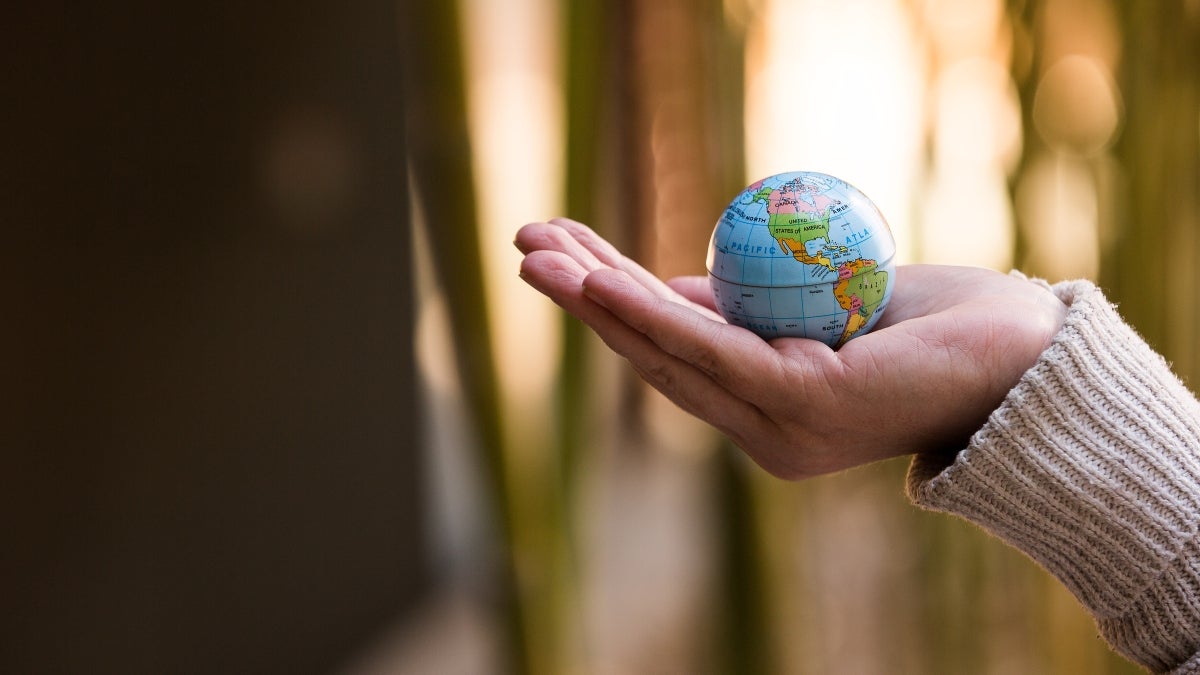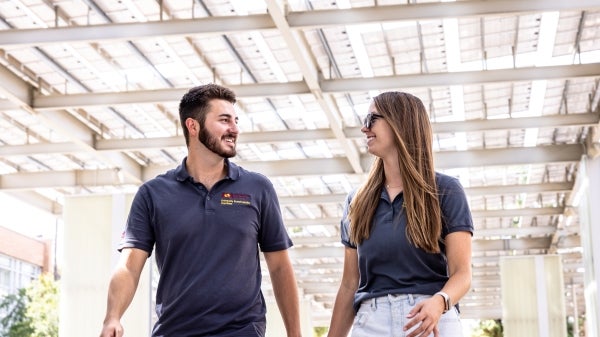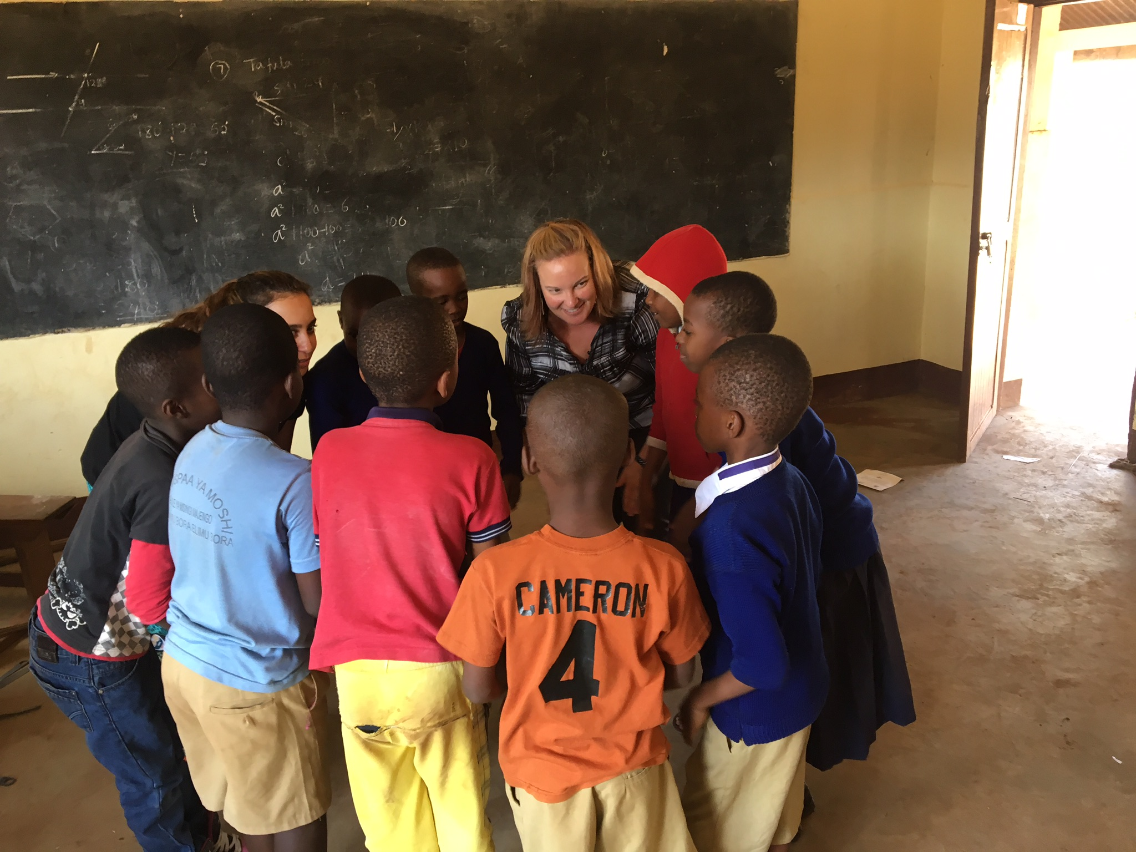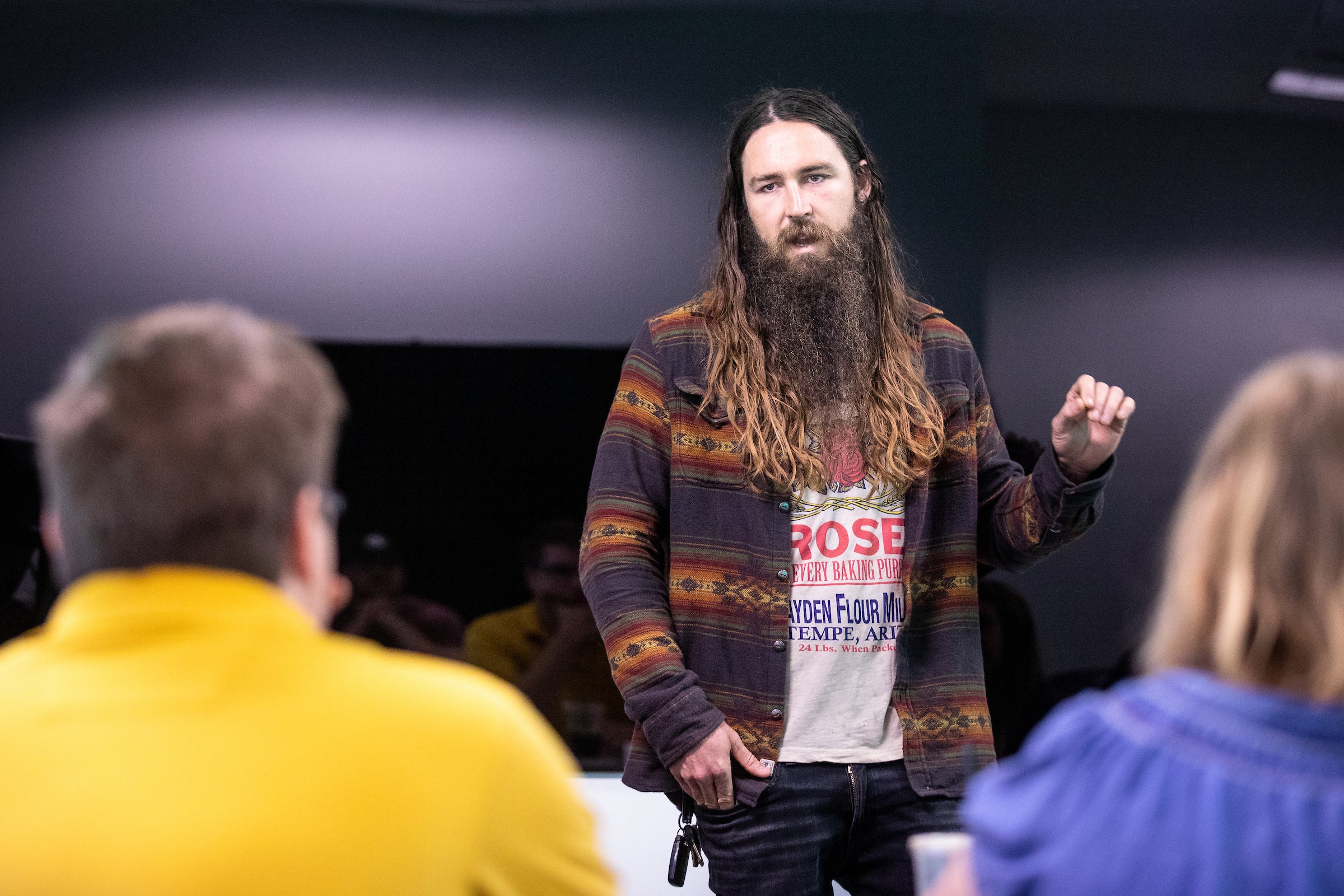ASU alums in range of careers are committed to sustainability practices

Students at Arizona State University can choose from hundreds of degree programs, and any one of them can lead to a lifelong commitment to treating the planet gently.
These three ASU alumni are making the world a better place through their sustainability work in their careers.
Debbie Namugayi
As the sustainability manager at Eastern Kentucky University, Debbie Namugayi calls herself a “a Jill of all trades” who works with a wide range of people not only on day-to-day behavior changes but also on broad policy initiatives.
“It’s not just strictly focused on energy or a policy but on the university as a system,” she said. “To get us to reach our carbon neutrality goal, every sector and every action across campus matters.”
Namugayi has worked on capturing the interest of students, who may be more interested in thinking about their careers or engaging with their social circle.
Debbie Namugayi, who earned a master's degree in sustainability at ASU, is the sustainability manager at Eastern Kentucky University.
“It’s essential for sustainability professionals to engage with those who are not already green-minded,” she said.
She finds that incentivizing it with fun works better than asking people to be martyrs.
“At every institution I engaged with fraternity and sorority life, which is a group that has events, engages with the community and has a bit of friendly competition,” she said.
When she worked at the University of Maryland, she facilitated a “green chapter” program for Greek life, modeled after “green office” programs, in which the chapter could be certified for practices such as recycling or creating zero waste in group spaces.
“I want to engage people in a positive way that goes to their value system and makes them feel good rather than that they’re giving up something. They’re excited to be contributing to a better planet.”
Namugayi said that ASU’s School of Sustainability, where she earned a master’s degree in 2014, was a perfect fit for her interests. She had studied environmental science as an undergraduate, but wanted to work on finding answers to the problems she was learning about.
“I was excited to have a program that focused on sustainability as a science, with a holistic solutions approach,” she said.
She’s working to make sure that sustainability doesn’t end at the edge of her campus. One of her recent projects at the 16,000-student Eastern Kentucky is a bike-share program that will include the surrounding community.
“It gives the university a chance to create a sustainable infrastructure and bridges the concept of how we engage with the community,” she said.
“It’s one thing to say, ‘We’re going to have bikes on campus that you can rent,’ but it’s another to say that we’re going to connect a mostly suburban county through bike sharing.”
As a sustainability professional, Namugayi has incorporated changes in her personal life, like walking to work and trying to eat a more plant-based diet and has recently begun sharing her experiences on social media.
“The response was crazy. One person wanted to talk about my thoughts on individual actions versus policy changes and my answer is, we need both,” she said.
People were especially interested when she posted about how she spent several months considering whether to buy reusable sandwich bags, which she eventually did.
“Zero waste shouldn’t be about consumerism. It should be about the next step after consumerism — how you take your impact further with your purchase,” she said.
Katherine Palmer
Katherine Palmer has been able to make a direct connection in sustainability from something she holds in her hands in Arizona to its source in the foothills of Mount Kilimanjaro in Tanzania.
Palmer, the curator of education at the Musical Instrument Museum in Phoenix, is also a professional musician, playing the clarinet with the Mill Ave Chamber Players. Clarinets are made of wood from the mpingo tree, a cultural icon of Tanzania.
For the past seven summers, Palmer has traveled to Tanzania to teach music to children, talk about conservation and plant mpingo trees.
“The clarinet is made from the national tree of Tanzania, so the wood has a direct connection to the country,” said Palmer, who has two master’s degrees and a doctorate degree from ASU. She's also a faculty associate in the School of Music.
“It’s becoming endangered because they’re exporting the wood and not replanting at a sustainable rate.”
Katherine Palmer has been teaching music to children in Tanzania as part of the Daraja Music Initiative, which also plants mpingo trees. She earned two master's degrees and a doctorate from ASU's School of Music.
In 2012, Palmer started volunteering with Daraja Music Initiative and became executive director in 2016. So far, the group has planted about 2,500 mpingo trees in Tanzania.
In addition to traditional fundraising, the nonprofit uses a volunteer-tourism model. Music educators, instrument repair technicians and people interested in conservation pay to travel to Moshi, Tanzania, to teach music to young people in the village. The volunteers' room and board is covered and they get to go on a three-day safari as part of the trip.
“In addition to providing music education for these students, we’re also providing conservation education to talk about sustainability, specifically about the instruments the tree makes,” Palmer said.
This summer, 16 volunteers taught 100 young people, planted 200 trees and reached 1,500 community members. The Daraja Music Initiative received nongovernmental organization status in Tanzania this year.
The dense, beautiful wood from the heart of the mpingo is used in clarinets, oboes, piccolos and finger boards of string instruments, in addition to carved artworks and souvenirs as well as for medicinal purposes. The mpingo grows slowly and cannot be harvested until it’s at least 70 years old.
“It is said to absorb four times the amount of carbon as a typical tree and it’s nitrogen fixated, so it makes the soil more fertile,” she said.
Schools in the village don’t have many extras, like music lessons.
“They get five days a week of music class in June and July and they also receive lessons in conservation. It’s not just about trees, but also water sustainability, reduce-reuse-recycle, the tenets of environmental conservation,” she said.
“We take them to the foothills of Kilimanjaro to learn about the environment there, we’ll take them on a hike to a waterfall and talk about the importance of water. We’ve taken them on a small safari to a national park to see the animals there.”
Palmer was drawn to ASU’s School of Music in order to study with Robert Spring, professor of clarinet. She earned a Master of Music in 2009 and, with the unstable economy at that time, decided to continue her studies.
“There were no jobs, and I knew I wanted to teach higher education so I stayed on and did a doctorate of musical arts and while I did that I pursued a second master’s, in ethnomusicology, as a way to build a bridge between these two things,” she said. “I was interested in musical representations around the world and also clarinet performance and how those two things can inform one another.”
She started as an intern at the Musical Instrument Museum in 2012 and offered to start an early childhood music program, which became Mini Music Makers. She was hired full time and promoted to curator of education, a newly created role, in 2017.
Every summer, she devotes several weeks to Daraja Music Initiative, which has influenced her personal life.
“When you come back from a less developed nation like Tanzania, you are far more aware of how you use your resources.”
Patrick Ware
With a business based on a love of the outdoors, a commitment to sustainability is natural for Patrick Ware.
Ware and his business partner, Jonathan Buford, founded Arizona Wilderness Brewing Co. in 2013. The craft-beer brewery has two restaurants, in Gilbert and downtown Phoenix, that focus on sustainable practices and local ingredients. He is the brewmaster.
Ware always loved the outdoors but had never been backpacking until Buford took him on a trip soon after they met. They realized they shared an ethos for conservation.
“It’s blossomed from spending time in the wilderness and realizing that we’re insignificant on this earth and there’s a mutual respect we hold for Mother Nature,” he said. “And then as you push some of these initiatives forward, you realize there are a lot of people who feel the same way.”
Ware has seen how a strong commitment to sustainability can work both ways on a business balance sheet.
“Philosophically, we’ve driven a few things that if you look at a number crunch profit and loss, it may say you’ve made a poor business decision,” he said.
Patrick Ware, co-founder and brewmaster of Arizona Wilderness Brewing Co., is committed to local ingredients at his restaurants. He earned a bachelor's degree in interdisciplinary studies from ASU. Photo by Charlie Leight/ASU Now
One of those is the company’s partnership with Sinagua Malt, an initiative founded by the Nature Conservancy to have farmers in the Verde Valley plant barley, which diverts far less water from the Verde River than alfalfa or corn. Sinagua Malt buys the barley, processes it into and malt and sells it to craft brewers.
“It’s saving 50 million gallons of water a month, and it’s the biggest thing we’ve ever done in terms of sustainability,” Ware said.
The team knew that it would boost the cost of raw materials by about 30%.
“I talked to customers and asked, ‘If we added a quarter to a pint of beer, would you be willing to pay it for this?’ And it was an overwhelming yes.”
But Ware did not foresee that there would be additional costs, for research and development, problems with the grain, logistics and labor.
“It’s good to be naïve and just go after things that you believe in because otherwise you’d just analyze and say, ‘The risk is too much,'" he said.
Another sustainability initiative the team pushed is using Arizona Grass Raised Beef in their burgers.
“In a perfect world we’d walk to the farmers market to buy everything, but in a high-volume restaurant, that’s not feasible,” said Ware, whose restaurants use 100,000 pounds of beef a year.
So AZ Wilderness pressured their food distributor to pick up the local product, and it did.
Their commitment to local ingredients runs deep.
“Last month we went for four weeks in a row to pick blackberries in Cornville,” he said. “It was hot and we spent three hours and got less than 100 pounds a week and our goal was 500 pounds. It was a lot of more bandwidth than just clicking on the internet and having it show up on the doorstep,” he said.
“In the long run, these initiatives will ultimately raise sales because when people know about it, they feel like they’re actually able to make a difference. It’s conscious consumption.”
Ware found his passion for craft beer while he was an undergraduate at ASU and met someone who was fermenting homemade beer in a closet.
“So my brother and I started home brewing and we were obsessed,” he said. “I had six roommates and they would drink even our worst beer.”
As an interdisciplinary studies major, he was able to explore his passion in a variety of contexts.
“The interdisciplinary world is very open to interpretations of history and science and art, and is very broad and adaptable, so every project I did was based on beer,” he said.
After graduating in 2008, Ware was determined to get into the industry, despite the tough economy. He started as a keg washer, making $9 an hour, riding his bike to work and sleeping on friends’ couches. The launch of the brewery was delayed for financial reasons, but Arizona Wilderness was named the best new brewery in 2013 — a designation that brought an avalanche of attention.
Now, with 150 employees, Ware is eager to share his and Buford’s vision of sustainability, so he’s taken them to see where the food comes from.
“Can we get our core people to visit the malting facility and go to the ranch to see the cows, because once they do that, it’s at the forefront of their consciousness and they’ll be way more passionate about it.”
Top photo by Deanna Dent/ASUNow
More Environment and sustainability

Charles Redman, founder of the School of Sustainability, faces a new adventure: Retirement
At the retirement celebration for Charles Redman on Oct. 22, two messages persisted: Redman’s contributions to Arizona State University helped to shape the interdisciplinary efforts we now find…

10 climate insights to guide our future
A group of globally renowned social, natural and climate scientists has once again convened to offer their newest annual synthesis report, “10 New Insights in Climate Science.”The report, published…

The future is green: Job demand translates to high employability for ASU sustainability grads
A 2023 report by Forbes on the state of green jobs confirmed what Arizona State University has been trumpeting for years: Sustainability will play a large part in the new economy.The report suggests…


